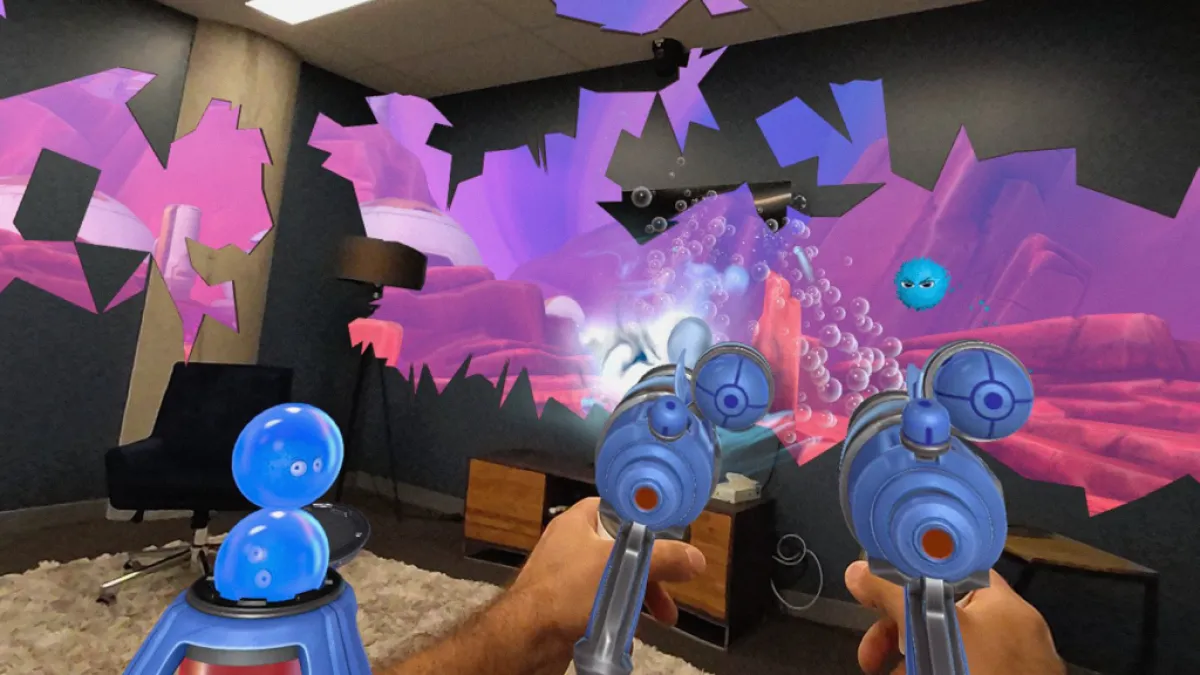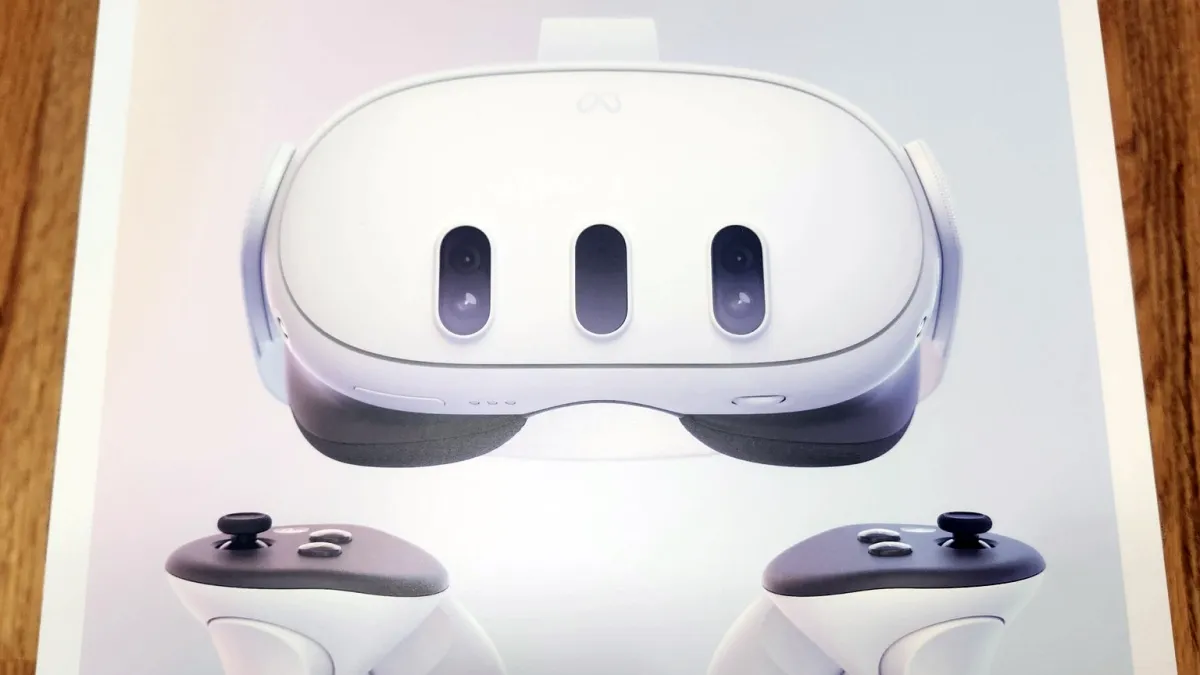There’s something specifically difficult about reviewing a piece of hardware like the Meta Quest 3.
The issue comes from just how difficult it is to describe playing a game in VR. You can watch videos or read about how entering a VR space feels, but the experience is hard to put into words. Putting things into words is my job, though, so I’m contractually obligated to try. What I’ll say is that it’s often uncanny. There are ways your body reacts to what’s going on that feel real, which rub up against the knowledge that what you’re seeing isn’t real at all. This leads to an incredible feeling of immersion with just a splash of cognitive dissonance.
That was nowhere more obvious than in my first experience with VR, which was the Oculus Quest in 2020. An early-adopter friend invited me over to his house with the express goal of getting me to try out VR. I stood in the center of his otherwise barren living room, the two-tone linoleum cold under my feet, and strapped the headset on. The first thing he had me do was play a game in which I was on the edge of a mountain and attempt to walk off a cliff.
Even though I knew that what I was trying to do wasn’t real, and I could feel a floor that was too cold and flat to ever be a rocky surface, there was a weird dissonance that crept through me while I was using the Oculus. I knew that I was standing in a friend’s living room, but I still hesitated to move forward and step off the cliff. When I finally did, for just a moment, that sinking feeling that makes roller coasters simultaneously pleasant and unnerving fluttered up in me.
Related: Best Meta Quest 3 Mixed Reality Games

By the time I took off the headset, I was sold on the idea of VR as an immersive experience. There wasn’t any discounting just how cool it felt to be in the game. However, the technology still felt relatively young. The graphics weren’t particularly stellar, the headset was a bit awkward, and the motion tracking wasn’t always perfect. I tried out the Quest 2 when that came around, and although it felt like an improvement, it still wasn’t quite what I wanted. It was good, but there was still a lack of refinement that kept me from really sinking in.
I sunk right into the Quest 3.
The Quest 3 just feels good. At first, I was pretty skeptical of its head strap. It was the sort of thick Velcro I remember being on my hockey equipment growing up. However, I found that, once I got a feel for just how to adjust the headset, it became quite easy to get the fit right and to manipulate the lenses until everything was quite clear.
Setting boundaries, which was a massive pain on previous versions of the Quest, is also a ton easier now. All you have to do is look around the room, and it’ll automatically figure things out. I never had any issues with the automatic settings picking out an appropriate boundary, which is very nice. The passthrough is also much improved, and although it’s still pretty grainy, it’s a massive leap forward over the weird television-fuzz world of the Quest 2.
To test out the Quest 3, I played a wide variety of different games, from puzzle to action games. I want to start with the former. The main game I played was Cubism, though I did dive into I Expect You to Die 3. Cubism is a minimalist puzzle game in which you rotate blocks to fill up a shape. The controls for Cubism felt so good. Being able to pick up blocks in my hand and spin them around to accomplish my goal felt incredibly rewarding and relaxing. I felt like I could just lay back on my couch and play the game all day, either with the music on as a meditative experience or while listening to a podcast.
I Expect You to Die 3 brought a bit of tension to the experience, but I still found myself really immersed in the world and the gameplay. Even when I wasn’t succeeding at the puzzles, the actual act of moving around in the world and manipulating objects felt neat to me. Both games felt immersive, and I had a sense for how far I needed to reach to grab something. There was still some cognitive dissonance that pulled me out, but it was absurdly minor.
As for action games, I tried out Assassin’s Creed Nexus, which Jason Coles’ review made me want to play. There was a level of immersion to the game that was just incredible. Moving through levels felt great, and the motion tracking during combat sections felt pitch perfect. I felt like I was really involved in the action, and I had genuine physical reactions that reminded me of the first time that I’d played VR while moving around the world. I moved my whole body while climbing up walls entirely on instinct, because having to reach up and stretch just felt natural.
Related: Demeo Battles Is an Excellent, Fast-Paced VR Game [Review]

That seems like a great place to stop a review. I mean, I’ve told you about the technology and why I liked it. However, I want to talk a bit about the circumstances in which I was playing the Quest 3. I played primarily over the Thanksgiving weekend in the US, during which time we hosted a bunch of my partner’s cousins. I decided I wanted to let the group try the Quest 3 out with me. The people there had pretty varied levels of experience with VR and gaming in general. We casted the games to the TV so that everyone could watch.
Getting the actual set onto people’s heads wasn’t particularly difficult, and people picked up the controls quite fast. We went through a nice little selection of games, though mostly things I thought would be neat to watch on TV. I decided to download The Climb 2, since there’s nothing like falling off the side of a mountain to give people the feeling of falling.
Every single person who took a turn on The Climb 2 talked about that feeling, which was the same one that I had when I first played VR. There was something special about being able to share that with people for the first time and to introduce them to that sort of immersion.
One of the comments that stuck with me from the group was that the Meta Quest 3 felt like the Wii to them.
That’s not to say that the Quest 3 is just an extension of the Wii, but that it represents a jump in technology. The jump from regular analog controllers to motion controllers felt monumental in 2006, and when my first friend got a Wii, we all hung out and played with it. The technology was, like with the Quest 1, a bit awkward, and there were issues getting the tracking to read right. Still, it was exciting and new.
The Meta Quest 3 isn’t exactly the Wii in this regard, but the whole thing does speak to the fact that if big money, like what Meta has, keeps standing behind the technology, it’s likely to start pulling people in. There’s a lot to experience when it comes to VR, and I feel a bit like we’re approaching an era when it’s becoming more than just a gimmick. The Meta Quest 3 has made me believe that VR is not just worthwhile, but something with incredible potential because of all the possibilities that it presents.
As I’m wrapping up, I do want to talk a bit about the problems I found with the Quest 3, because even though I did enjoy it, I have my critiques. A lot of the games I tried out and played were originally for the Quest 2, so while I did enjoy the experience of playing them, I’m not certain I really got to take the Quest 3 to its limit. I think the biggest problem I’m running into at this point is that there’s not as much taking advantage of the Quest 3 as there could be. I’m hoping in a year that I’ve got a great back catalog of titles to go through. However, as so many consoles have proven in the past, sometimes that just doesn’t happen.
There’s also still a fair amount to be desired in terms of the actual user interface. It took me a fair bit longer than I would have expected to adapt to where to find different apps and how to get certain things to work right. One way that manifested was in trying to figure out exactly how to re-center the menu and bring it up during games, since the button that’d done it in one instance didn’t always do it in another.
Eventually, I did settle into a rhythm with it, and after a bit of time playing around, VR felt like second nature. However, that lack of handholding initially made using the console odd and a touch confusing. Without what few tutorials I received, I might have been entirely lost.
Overall, though, I love the Meta Quest 3, and I can firmly say it’s made me a believer in VR. I’m excited to play with it for a long time to come.
You can pick the Meta Quest 3 up online for as low as $499.99.
A Meta Quest 3 unit was provided for review purposes along with codes for Vacation Simulator, Job Simulator, Cosmonious High, and I Expect You to Die 3.
At The Escapist, our team is obsessed with all things escapist entertainment. The content we create, and products we recommend, are thoughtfully curated by our expert team of independent enthusiasts with the highest level of editorial integrity and a clear focus on providing editorial coverage that both we, and our audience can geek out on. If you purchase through our links, it is possible we may receive a commission on the back end, but we only endorse products that we actually believe in and would buy (or have bought) for ourselves.






Published: Nov 28, 2023 10:11 PM UTC